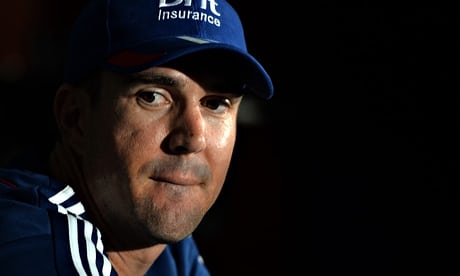I am a cricketing purist. I've grown up believing that the pinnacle of a cricketer's career should be to play Test match cricket for their nation. I support the idea that cricketers should be dressed all in white as opposed to coloured pyjamas and I am not of the opinion that for a game of cricket to be interesting, batsmen must be scoring at well beyond a run a ball. That being said, I am also a realist and I know that cricket, as with all walks of life, must continue to grow and develop with the times.

Watching this evening's T20 Vitality Blast (the domestic T20 competition in England) and considering the uproar that has surrounded the selection of Adil Rashid for the Test match squad this week, I was struck by a feeling of just how lucky English cricket has been in recent times.
The game in question was Yorkshire v Birmingham (Warwickshire have changed their name for T20 only) a game which featured Jeethan Patel, Grant Elliott and Boyd Rankin all playing for Birmingham. Here we have 3 players who much like Rashid (who also played in the match) have made career decisions in their own self interest as opposed to pursuing what many would see as the ultimate goal of representing your country of birth in a Test match. Take for example a player like Jeethan Patel who has played just 24 Test Matches for New Zealand in a career spanning 12 years. Is this because New Zealand don't consider him good enough to play at Test level? No, it is not. In fact, in 2014 New Zealand asked Patel to resurrect his Test career but the off-spinner refused and decided to remain a full time overseas pro with Warwickshire where he ended the season being named the MVP across all domestic cricket in England.

Similarly with Grant Elliot and Boyd Rankin we see players who have played international cricket for multiple sides because at certain times of their career, it has benefitted them to do so. Those benefits are sometimes strictly in cricketing terms but very often they are also made solely on the basis of financial rewards. English domestic cricket in particular has benefited from an influx of international quality players largely from nations such as New Zealand, South Africa and The West Indies. These are cricketers who have given up chasing the dream of Test cricket and taken the "easy option" of a domestic, Kolpak contract and/or have become a mercenary on the global T20 franchise market.

The fact that players are motivated by money and status is universally accepted in almost all other major global sports. Therefore, it is hard to see why English cricket supporters and purists such as myself, have such a hard time understanding why Adil Rashid would reject opportunities to play county cricket in favour of pursuing lucrative contracts with T20 franchises and, if the opportunity presents itself, also playing at the highest level for his country.
In English cricket the question of club v country or country v T20 franchise is one that we have been avoiding for several years. Prior to 2015 it was fairly simple for English cricket in that our ODI and T20 sides were generally speaking so poor that there was little risk of a player even being considered for a lucrative contract in for example the IPL. The only player that England possessed that was in high demand was Kevin Pietersen, a cricketer whom himself rejected his native South Africa in order to play for England. There were several issues that lead to the breakdown in the relationship of KP and ECB but chief amongst them was Pietersen's desire to play a full part in the IPL and England's refusal to release him to do so.

However, the last few years have proved to be different with England now being a dominant force in white ball cricket and players such as Adil Rashid, Jason Roy, Alex Hales, Jos Buttler and Ben Stokes to name just a few, earning significant amounts of money playing on the global T20 circuit. The simple fact of the matter is that any sportsman will always follow money and status in just the same way that you and I would in our chosen profession. Again, we have been lucky in England as our international cricketers are well compensated and the games they play in well attended. Despite this the pull of T20 franchise cricket remains strong. For those players who are not automatic picks in all forms of the game for England, it's understandable that they would give serious consideration to abandoning the long hard slog of a county season, trying to win their Test place back for a 2 or 3 short stints in various leagues around the world. As well as the money & status, such decisions can help to extend a cricketers career and of course their earning potential by several years.
I do have some sympathy for Yorkshire CC because they are a county that has always tried to develop local youth and have an excellent record in bringing that talent through to the international stage. England's selection of Rashid is something of a slap in the face to that process. It was announced this week that Liam Plunkett who also has a white ball only contract with Yorkshire and is a highly successful member of England's T20 & ODI sides will be leaving at the end of the season to join Surrey. I wouldn't be surprised if Adil Rashid followed him out of the door. Whether counties or for that matter the ECB entertain players excluding themselves from certain forms of the game is in my opinion irrelevant. The ECB has stated that the Rashid case is a one off and that players not making themselves available for county selection will no longer be considered for Test match selection. That is like trying to plug a hole in the dam by putting your finger in it. More and more English qualified players are choosing a similar route to Adil Rashid and this will only increase in the years to come as T20 cricket establishes itself as the dominant format.

The ECB for their part are looking at ways to try and revolutionise cricket in this country by bringing in a 100 ball competition and belatedly we will get a franchised T20 competition that could rival the IPL and BBL. However, for me the answer to the problem of England losing players in the manner described above is quite simple - create more international quality players! This will probably need to be considered fully in another blog but what the ECB must do in my opinion is get cricket back into to state schools and invest in it's grass roots development in order to increase the number of people playing the sport in England. Had we have had choices for a 2nd spin option in this country then we wouldn't be having this debate in the first place. Ed Smith has justified Rashid's selection by stating that it has been made in "exceptional circumstances" due to England's other spin options (Jack Leach & Dom Bess) being unavailable. These circumstances are not exceptional! In fact if you look across all areas of the England team as a whole we have very few players genuinely competing for places. Who is going to replace Cook when he retires? Where are the bowlers coming through to step into the shoes of Anderson & Broad? I would suggest that England really can't afford to be that picky when it comes to their selections at the moment and Rashid's call up is proof of this. By comparison India have a never ending stream of talent coming through from their grass roots level, into the age groups (they are current U-19 world champions), the A team and then Test level. Whatever the result of the upcoming series the future looks much brighter for Indian cricket than it does for England or any other Test playing nation for that matter.
Comments